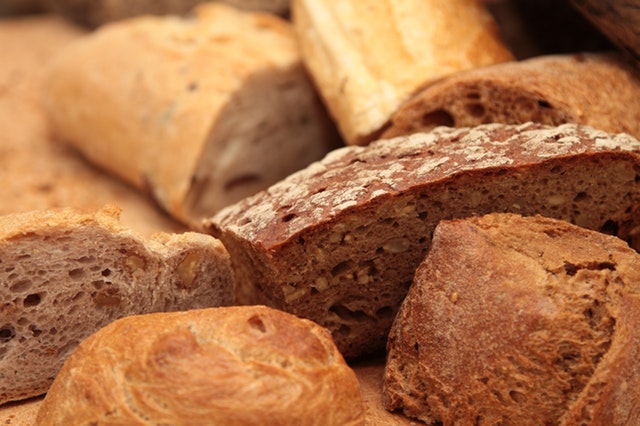Carbohydrates have a reputation for being unhealthy. However, it is only the type of carbohydrate that is unhealthy. Carbohydrates are actually the body’s preferred fuel. Unrefined carbohydrates like whole, sprouted: legumes, lentils, seeds (examples: quinoa, sesame, pumpkin), grains (example: rice, teff), and vegetables (example: potato), are dense in nutrients and fiber, and they can give your body the fuel it needs. In this article, I will expand on which varieties are best, which ones to avoid, and how to prepare the ones that are healthy.
What we usually think of, when we hear the word carbohydrate, is a white, refined, wheat-based type of food. Refined carbohydrates like white, refined flour, pasta, and bakery goods have no or little fiber and are nutrient-empty. There is a difference in the way refined carbohydrates and unrefined carbohydrates are converted into glucose by the body. Refined carbohydrates are converted to glucose quickly, which causes blood sugar to spike. This makes the body work hard to get the blood sugar level under control. It puts pressure on the pancreas to make and release insulin, which works “like a key to open the door of the cells so glucose… can come inside and be converted into energy.”
If too many refined carbohydrates are eaten on a continual basis, driving up blood sugar levels, this will stress the pancreas and eventually it will have trouble making insulin. This can result in diabetes.
The body will also turn the excess glucose into fat. This can result in weight gain and obesity. Carrying too much fat can lead to glucose intolerance. The body will start ignoring the signal to take glucose from the blood.
Many nutrient-empty, refined foods have fructose (including high fructose corn syrup or agave syrup) in them. Fructose doesn’t appropriately stimulate insulin production, which means the body fails to suppress its “hunger hormone” leptin. This hormone suppression is what makes us feel satisfied, so fructose is actually making us feel hungrier instead of satisfied.
Gluten is a protein found in wheat, rye, spelt, and barley. More and more people these days are being diagnosed with gluten intolerance or celiac disease. An estimated 20 million Americans have gluten sensitivities. Because of hybridization, many gluten-containing grains today have 50–80 percent more gluten in them than they did 100 years ago.
The word “gluten” comes from the Latin word for glue. If you’ve ever made papier-mâché using glue made from wheat flour and water, you can understand how this mixture can be very hard for your body to digest. Symptoms from consuming grains containing gluten range from digestive problems to dandruff, skin disorders, kidney problems, and depression. Many people feel better when they eat a gluten-free diet.
Wheat is a grain that might be best to avoid for more than a few reasons. Wheat has the unusual characteristic of being able to raise blood sugar extremely quickly. Also, according to Dr. Steven Greer and David Wilcock, in 1960, Archer Daniels purposely developed a variety of wheat, with a protein called gliadin, to have more addictive characteristics in it than cocaine or heronine. You can find this gliadin protein in wheat, rye, and barley. You may also find it in oats, even though oats are gluten free. He said they developed it to have unnatural molecules in it that trick the thyroid into thinking it is T1, T2, T3, and T4, but it is not. This creates chemical imbalances. What this will do is effectively shut down the thyroid, which is our master gland that controls many of our bodily functions. The person who ingested this wheat (grain) variety, will be unable to get enough energy, and this leads to depression. Dr. Greer and David Wilcock said this became public knowledge from four of the scientists who worked on this food, for the company, Archer Daniels, reported this to the Christian Broadcasting Network. Gliadin has also been found to create permeability of the intestines.These are some fhe reasons why so many people are having intestinal problems, thyroid problems, and are finding that they can’t eat wheat or wheat products. As we can see, it’s not just the gluten that is causing these health problems. (I personally think this is very sinister that this was done and the FDA allowed it.)
In addition that, many of our foods today in the western countries “contain narcotic properties associated with the presence of psychoactive chemicals that bind to opioid receptors in the nervous system. These peptides are so powerful that researchers block their action with drugs such as naltrexone which is used to treat addiction among heroin abusers, and naloxone which is used to prevent death from heroin overdose.
- Gluten exorphin A5: H-Gly-Tyr-Tyr-Pro-Thr-OH
- Gluten exorphin B4: H-Tyr-Gly-Gly-Trp-OH
- Gluten exorphin B5: H-Tyr-Gly-Gly-Trp-Leu-OH
- Gluten exorphin C: H-Tyr-Pro-Ile-Ser-Leu-OH
- Gliadorphin: Tyr-Pro-Gln-Pro-Gln-Pro-Phe”
This wheat is going to do this to the body, whether it is refined or not. So, eating it as a whole grain won’t matter. My recommendation is: whatever grain, bread, or carbohydrate you buy, you want to make certain you always buy Organic and non-GMO foods both, and try to avoid purchasing breads or crackers containing wheat, especially ones that aren’t sprouted or whole.
Then, to process these nutrient-empty, refined foods, the body must pull nutrients from itself. The spiking of blood sugar from refined and empty food results in cravings, because when the body is not getting the nutrients it needs, it will start begging for them. On the other hand, feeding the body with nutrient-dense food gives it what it needs, and there shouldn’t be any cravings.
Because unrefined carbohydrates are fiber-rich, they take longer to digest. This means they do not put additional pressure on the pancreas to produce insulin in an unhealthy way. Unrefined carbohydrates, such as sweet potatoes, should be a major part of a well-balanced diet.
Packaging can be very deceiving and misleading. When looking at a package that says “whole wheat” or “whole grain,” read the ingredient list and make sure it says “whole” before every grain listed. If the ingredient list contains just the name of the grain, then it is not whole-grain.
You also want to make sure any of these products or foods are sprouted, so the phytic acid and enzyme inhibitors are removed. Many carbohydrates, as well as proteins, (nuts, seeds, grains, beans, and lentils) are very healthy for you and are full of nutrients. But many people don’t know they contain phytic acid. Phytic acid can prevent the body from absorbing important minerals such as calcium, magnesium, iron, and zinc, as well as cause acid indigestion.
Phytic acid has powerful anti-nutritional effects because it binds to minerals in your food to form phytates, which makes those minerals unavailable to your digestive system. It also inhibits enzymes in the body that are vitally important for digesting food properly. The high level of phytic acid in nuts, seeds, grains, beans, and lentils is a serious problem in the modern diet, resulting in many health problems including tooth decay, nutrient deficiencies, lack of appetite, and digestive problems.
The phytic acid in nuts, seeds, grains, beans, and lentils can be removed by soaking and sprouting them. Historically, indigenous cultures always did this before consuming them or feeding them to their animals. This is not done in modern day society, to the detriment of human and animal health. This is why my cookbooks Include the steps of preparation, which includes making these foods free of the phytic acid and enzyme inhibitors.
If you are buying gluten-free products, make sure they are sprouted and whole-grain, or sprouted beans, sprouted lentils, sprouted rice, sprouted, and check the sugar content. I have found that even in the seemingly healthiest packages at the “healthy grocery stores,” the gluten-free foods are alarmingly high in sugar. It is extremely important to find ones that are low in added sugar, preferably organic, non-GMO, whole-grain, and sprouted.
So, in conclusion, as we get into the holiday season and we are out dining/ partying at places where there may be a lot of carbohydrate choices, try picking the healthiest ones and avoiding the ones that can damage your health and well-being.
copyright@nancyaddison2018
Please, leave a comment and join in the conversation!
I’d love to hear from you!





